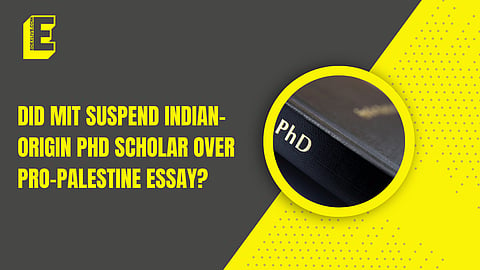

The Massachusetts Institute of Technology (MIT) has barred Indian-origin PhD scholar Prahlad Iyengar from entering its campus until January 2026, following his pro-Palestine essay published in Written Revolution, a multidisciplinary student magazine. This was stated in a report by India Today.
The suspension, which many believe could end his academic career at MIT, also jeopardises his five-year National Science Foundation Graduate Research Fellowship.
MIT cited that Iyengar’s essay contained language that “could be interpreted as a call for violent protests on campus.”
Additionally, the magazine edition featured images linked to the Popular Front for the Liberation of Palestine (PFLP), designated a terrorist organisation by the US State Department. MIT has also banned the magazine.
Iyengar, pursuing a PhD in Electrical Engineering and Computer Science, denied the charges, asserting that the images were added without his involvement. He characterised his suspension as “extraordinary” and a broader attack on free speech on American campuses.
“These extraordinary actions should concern everyone on campus. Expelling me and banning Written Revolution from campus as a result of this article would mark an unprecedented attack on the rights of the entire student body and faculty,” Iyengar stated in a letter shared by his lawyer, Eric Lee.
The essay, titled On Pacifism, did not directly advocate violence but questioned whether non-violent tactics were effective for the Palestinian cause. Critics argue MIT’s decision represents a crackdown on dissenting views.
The MIT Coalition Against Apartheid condemned the suspension, calling it an effective expulsion, and criticised the administration’s response. “After public backlash against Prahlad's campus ban due to an article about the pro-Palestine movement, MIT pivoted to suspending Prahlad on charges that have been resolved as informal warnings in similar scenarios,” the group stated on X.
The coalition has launched a campaign urging MIT to reverse its decision. "We call on all organizations and institutions of conscience to sign up and stand up to MIT's repression," their statement read.
Iyengar has appealed the sanctions, but his reinstatement depends on the same panel that issued his suspension.
